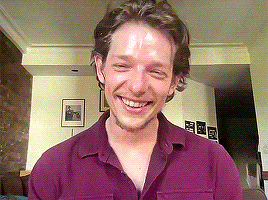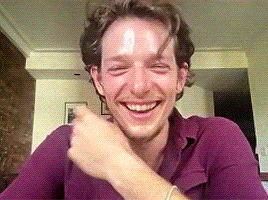media blog for our twitter @mikefaistinfosupporting our favorite actor
Last active 60 minutes ago
Don't wanna be here? Send us removal request.
Text


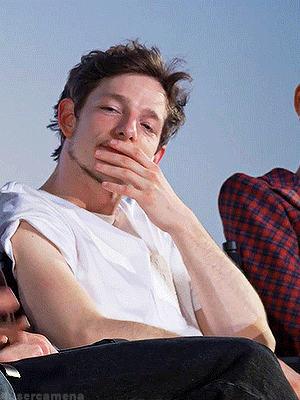

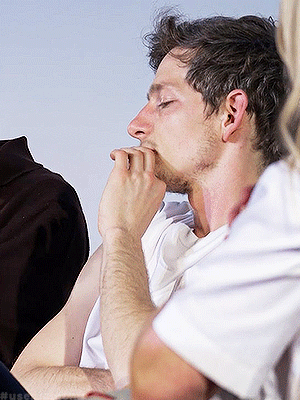
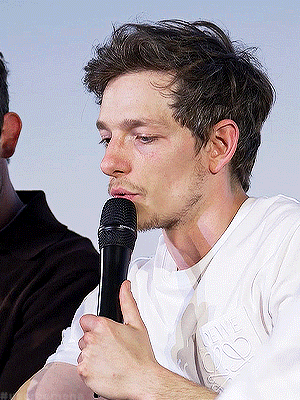


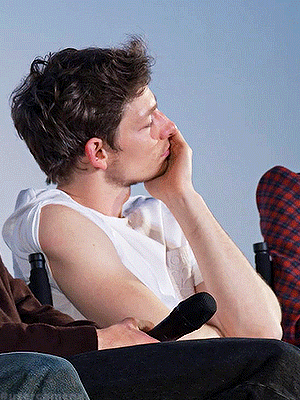

MIKE FAIST IN
CHALLENGERS — IN CONVERSATION: BAFTA Q&A
699 notes
·
View notes
Text



you didn't play baby john in a community theater production of west side story? what kind of theater person are you?
320 notes
·
View notes
Text

[CAR CRASH] [GLASS SHATTERING] 'GOOD LORD!' [GENERAL COMMOTION] [BABY CRYING] 'WAAAAH WAAAAH' [YELLING] [POLICE SIRENS] WEEWOO WEEWOO [HELICOPTERS] 'WE'RE REPORTING LIVE- '[EXPLOSION] 'MY LEG... MY LEG...'
684 notes
·
View notes
Text
Mike in the Q&A with Zendaya and Josh O'Connor for Amazon MGM Studios Guilds
Interviewer: [...] I love that you say that because I was just going to say to Mike is there's a lot of little moments that all of your characters get that I think tell a deeper truth about who they are. I actually think of the moment towards the end when Patrick is looking at the woman's breakfast sandwich and like is actually going to take it. Like, I'm like, this is who you are. I would die of the embarrassment that I even looked at this woman's sandwich, let alone had the audacity to eat it. And I was going to ask you, Mike, if you had a little moment that you felt was really illustrative of who Art is, that maybe the audience and again, those internal motivations that are not maybe in the dialogue, but tell a lot about who he is as a person and maybe what motivates him in this story.
Mike: Yeah, that's a very good question. There is one moment that jumps out to me in particular. And again, piggybacking off what Josh said, it is the, these conversations that we were very fortunate to have with Luca and each other all throughout that rehearsal process. And one of the things that was discussed about Art was this idea, you know, Patrick's character is much more, I think brazen, a little much more relaxed, much more calm about life in general, and Art's character is maybe a little bit more controlled, particular, very neat, very organized, trying to really make sure that things are correct. And within that, there's this this scene at the party and we're watching Tashi dance on the dance floor. And then we have a conversation with her and she leaves and we decide to stay and wait for her. And so Josh, Patrick, and Art. We're just sitting on the couch and and there's this dessert that was presented to us and it had it was like some sort of cake and it had an icing on top of it. And there was strawberries on top of the cake. And I remember thinking Art would love to eat the cake. They probably won't eat the cake. That's not the right thing to do. So I guess we'll have the strawberry. But then, the strawberry has icing on it, so he has to scrape the icing off of the strawberry. While he's eating and I remember doing that and that felt as if that, that probably was the correct choice, and I think it's in the movie. I don't know if it made it (Zendaya: it is! Mike: it is? Zendaya: it is!) it felt right (Zendaya: but it is) and it felt very indicative as to who this person was in terms of, you know, the decision to eat the cake or not eat the cake is its own thing and the consequences of that. Well, I guess. Yes. You know.
Interviewer: [...] I want to bring it to you, Mike. Because I feel like with Art, there's much more to find things. Yeah, starts off is very flirty and a little bit unsure. Then it becomes focused, and my favorite moment is right after the sign-in at the tennis match, when he hits that ball back at Patrick, we see basically the ice turn into fire. And that is like the biggest emotional shift we see from the character from that moment on and all of the stuff that comes after that has to be told through tennis. I'm curious, what was in the script? What were you trying to basically say in addition to those tennis moves that y'all are doing in that final climactic moment? There's a lot of emotion coming out from Art, like more so than you maybe even seen from him in earlier moments. I'd love for you to talk a little bit about that climax. And then I want to come to you, Josh, about how you were on the other side of that, because you essentially popped open all that emotion. So Mike, yeah.
Mike: Well, it's interesting because I think that was actually, it wasn't planned. Um, that moment, it was something that was felt, um, sorry, there, there's no way to articulate that other than, you know, I think there are these strange things that happen. Um, and they're kind of unexplainable where, you know, you, you do all of this prep work, you do as much thought as you can. Um, with the material that you're given, the conversations that you have with the creatives, the wardrobe that is, you know, built for you. And then at the end of the day, you're placed in that situation and you have to allow the character to kind of come forth and decide for themselves what is appropriate in that situation. And, and I remember that day very distinctly. Because we had been, we had been shooting, um, uh, that tennis, uh, see all those tennis sequences going back to that, um, for two or three weeks. Um, and, um, we did shoot that section of it towards the end of those two to three weeks. So there was this kind of natural progression leading up to that climactic moment that you're talking about. And, and, and that particular moment. Um, it just felt as if that this thing was coming out of me and it felt like Art was taking over-is the truth of the matter.
Um, and it's one of those, you know, unexplainable events where, like I said, you do this work, you do as much prep and thought as possible. And then you let these things kind of take over and let them go. And, and that felt also correct in the sense, for our characters, well with this person that does work so terribly hard in terms of making the right choice, and stepping in the right place, and doing the right thing in order to get to those places and here's with the situation where truly the game that is playing... if you were look at his career it really doesn't matter, however in this moment, you know because of the dramatic, the dramaticniss of the story that we're telling is the most important thing
And in this moment as well, he is letting go of all of that, which I think is, which I think is the thing that both Art and Tashi are trying to get out of him as not just a tennis player, but also a person. And it did feel as if when we, when I, I remember just reading the actual tennis sequence itself and the way that it had come across to me off of the page was, oh, now everybody has fallen back in love with not just each other, but the game and why they are doing it in the first place. And so that release of that tension that Art allows himself kind of allows everybody to let go of it all and just let go. I'm not being very articulate, unfortunately, with this, but I think it was just one of these things that naturally, that tension and buildup is kind of placed into Art's hands. And he has the decision as to how he's going to let both Tashi and Patrick kind of feel about it. And the choice that he makes is to actually kind of come into himself and let go of all of that and choose to engage with it.

26 notes
·
View notes
Text
WHERE TO WATCH
(FOR FREE)
Films:
The Unspeakable Act (drive)
Yellow (short)
Touched With Fire (drive)
The Grief Of Others (drive)
Our Time
I Can I Will I Did (drive)
Active Adults
Wildling (drive)
The Atlantic City Story
West Side Story
Pinball: The Man Who Saved the Game (drive)
Challengers (drive)
The Bikeriders
Series
Dancing with the Stars
Eye Candy
Law & Order: Special Victms Unit (drive)
Deception (drive)
Panic (drive)
Extra:
Brokeback Mountain
drive one: by: @/glueoffline on X
drive two: by me
2 notes
·
View notes
Text

Over and over again. I can’t stop watching.
141 notes
·
View notes
Text
NEW Q&A WITH MIKE FAIST
NEW: Q&A with Zendaya, Josh O’Connor and Mike Faist
4 notes
·
View notes
Text
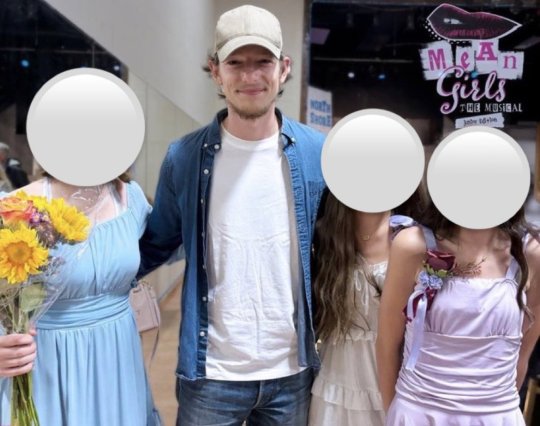
#NEW | Mike supporting his hometown’s production of Mean Girls Junior’s
13 notes
·
View notes
Text


#NEW: Mike Faist for Challengers (2024)
40 notes
·
View notes
Text
West Side Story’s Mike Faist Wishes He Got to Sing ‘America’
By Nate Jones, a Vulture senior writer covering movies and pop culture
From the very first trailers for Steven Spielberg’s West Side Story, one character popped off the screen — the scraggly John Mulaney lookalike playing Riff, leader of the Jets. Without taking anything away from Russ Tamblyn’s jovial performance in the 1961 film, this new Riff is something different. He’s a true street rat, almost feral with a live-wire charisma. Since the film started screening, viewers and critics alike have been asking: Who is this guy?
That guy is 29-year-old Broadway veteran Mike Faist, whom theater buffs will recognize as one of the newsies in Newsies as well as the depressed teen whose death kick-started the plot of Dear Evan Hansen. (Faist got nominated for a Tony but declined to reprise the role for the movie — a wise decision in retrospect.) West Side Story is his 14th screen credit but his first major film role, and it’s a true breakout performance: Alongside Ariana DeBose’s Anita, Faist’s Riff has been spotlighted as one of the best things about the new film, the personification of Spielberg and screenwriter Tony Kushner’s more historically grounded take on the material.
The praise is a long time coming for Faist, who shot West Side Story back in the summer of 2019. As he told Vulture over Zoom recently, he’s spent the intervening months looking for projects that would live up to the experience, living that #VanLife, and thinking about what he actually wants to get out of acting.
In the most recent interview I read, you’d left New York and were living out of a van.
The pandemic did a lot of weird things to everybody. I was working in Austin when everything shut down. They were going to send us back to New York. I’m in Austin. I have all this space, the sunshine. I’m not going to go back to New York and just hang out in my apartment during a pandemic. So I had my dog, and we drove around the country a bunch. I would purposefully stay away from people. I would find people that had farmland. They were nice enough to let me set up a tent. I actually sold my apartment in New York this summer. Got rid of it.
This is maybe a heavy question for early in the interview, but what did you learn about yourself from that experience?
I didn’t know that I liked being alone. I think it’s important to really get quiet. I lived in New York for 13 years. And when you’re here, it’s just like constant adrenaline. Which I love. But I think when you’re here, you don’t realize the toll that it takes until you leave it.
In that interview, you also said you weren’t sure if you hated acting or loved it. That was six months ago — have you come closer to an answer?
I’m embarrassed by this because everyone’s asking. It’s so strange. I don’t know, man. Ultimately, the issue really was that I had come off shooting West Side Story, which was such an incredible experience artistically. It was everything I wanted to do as an actor in terms of how I wanted to approach the work, what I demanded out of myself. And then I had to leave. Jumping into the next project wasn’t a negative experience. But one was such a fulfilling thing, and the other one, I was going to work.
So I was thinking, To what end do I do this? Ultimately, what am I trying to get out of this thing? Do I really need attention that bad? What are the things that I really want to do? Because if it’s just to go from job to job — which is a gift, so I’m not trying to knock it. But it was more just asking myself all these questions about what my goal was. And ultimately, I came to the conclusion recently that I love it. I love it too much, maybe to a fault. I’m a little precious about the craft of it all. I’m learning not to take myself too seriously. Enjoy it, let things come when they come.
You shot West Side Story two and a half years ago. What’s it like watching it after all this time?
It’s so weird. All that time was passing, and there was this thing floating there in the ether. And eventually, maybe the world was going to see it. I remember calling Steven over the pandemic, and I said, “For me, if nobody saw the movie, it wouldn’t matter because the experience was amazing.” Then you go and see the film for the first time, and you’re in a theater with only five people, and you’re just like, Huh.
How so?
In that initial screening, I wasn’t able to relive the experience of making it. You can’t help but watch yourself, and you can’t help but critique. While I was making the film, I felt like I was giving it everything that I had. And then when I saw the film, I was like, Oh, buddy, maybe you need to go find a different job. We’ve all talked about it as a cast. We drove home back to the hotel, and we were all like, “It’s a good movie. But man, I’m bad.” And everyone else was like, “No, you are great, I’m bad.” And I think Steven and Tony sensed that we were all too close to it to actually see what was going on. So they invited us back for another screening. The second time around, I was like, Stop being such an egomaniac and just watch the movie. And being able to remove myself more, I thought it was a great movie. But still, it was an entire theater with four people. At the premiere, I realized why it’s very important to have a collective experience of going to the theater. There’s something about communal experiences that allow you to see aspects of art that you wouldn’t necessarily experience if you were by yourself. And that’s the same thing for when you’re performing onstage in front of an audience. We’re all co-creators in this thing that’s happening right now.
I know the Bruce Davidson portraits of 1950s Brooklyn gang members were a key bit of inspiration for you. What struck you about those photos?
When I saw those photos, I knew that these were the guys. These are the Jets, visually, for me. I’m not trying to knock any production of West Side in the past, but there felt like there was maybe something missing — a certain groundedness, a seriousness or desperateness, that I started understanding as I was doing research. I think that pops off the page with Bruce’s photos. You see these guys, and they’re emaciated, they’re nihilistic, they just don’t care. You can tell that they cannot see what’s beyond tomorrow. And then as you do more research, you find out they’re all orphans. None of these people have families; the only family that they have is each other. And then on top of that, too, they’re heroin addicts. They’re broke. At the end of the day, they would pool money, and instead of really eating, they would just buy wine and get wasted. They just feel so lost.
Tony Kushner also does a good job of making the Jets the embodiment of 1950s white resentment. I’m curious how you approach that element of the character.
Can you elaborate on that a little bit more?
Sure. I mean the way they’re a community that sees people moving in from Puerto Rico and feels like they are an existential threat. They act out in ways that are, to modern eyes, quite racist. But obviously, it still gets at the fact that these are desperate orphans.
Where Tony really nails that, and Steven as well, is the setup of the film. The opening shot, where you see the demolition of all these homes so that Lincoln Center can get built. Everybody’s getting kicked out. It’s like the only thing constant is change. And that’s why this story’s going to be able to be told over and over again. Humans’ inability to deal with change, that’s what makes this story super fascinating to me.
It’s an interesting thing. There are racist acts that happen in this movie. Are the Jets racist? I don’t know. I couldn’t approach that from my point of view: being the actor, trying to empathize with this character who’s doing these really questionable things.
Because you’d be putting a judgement on it?
Yeah. I can’t do that as the actor. My job is to be like, “No, this guy’s the victim.” Now, I accept that this guy does a lot of racist stuff. But where it’s coming from is the xenophobia of it all. It’s the fear of the unknown. And from Riff’s point of view specifically, his home’s getting taken away. His best friend doesn’t want to be his best friend anymore. It comes down to this weird codependent relationship between Tony and Riff. I keep joking that it’s like Thanksgiving. Tony’s a guy who wants to not be that way anymore, but he’s still trying to be loving and have a conversation. But Riff doesn’t have the emotional intelligence to understand that.
Some productions of Romeo and Juliet add a romantic subtext to the relationship between Romeo and Mercutio. Was that something you guys were playing around with as well?
Romantic?
I mean, Riff is sleeping with Tony’s ex. I was wondering if there’s a little transference there.
I think it says something more about Graziella: She has to be with whoever’s the alpha at that moment. I’m not sure if it is romantic. If an audience member wants to interpret it that way, go ahead. That’s fine. But for me, I keep going back to the familial kind of love. Tony and Riff raised each other because there was no one else. They were their only line of defense. It spread out among other guys, but it all started within these two. Which is what we see in gangs, right? You don’t have a family, well, we got you. We will do this for you, but you have to do this for us. You don’t have power in that situation, but you feel accepted.
The new movie shuffles around the musical numbers in terms of who gets to sing what. Is there a song you wish you could sing, even if it doesn’t make sense for Riff?
I mean, “America” is amazing. Those dancers are incredible, man. They’re absolutely amazing. I would love to be in that number. I think all the Jet boys got a little FOMO from that one.
One thing that I and many others who’ve seen the movie have noted is your remarkable resemblance to John Mulaney in this film. Is that something you got before West Side Story, or is it Riff specific?
No, you’re not the first person to say that. People have come up to me and been like, “You ever get that you look like John Mulaney?” It’s fun. It would be fun to see John Mulaney as Riff in West Side Story, though.
He’s got the limbs for it.
For sure. He’s definitely got the nothing-but-arms-and-legs thing going on, like myself.
You said you’re trying to be a little more intentional about where you go from here. What’re the ideal next few years for you?
Tony used the word “stewardship.” And that’s very accurate. We had a deep respect for this story and the legends that have told it in the past. I feel like I have a great responsibility here to do this right. And on top of that, to tackle roles that force me to find the pieces of myself that I didn’t know existed.
What part of yourself did you find here?
I was reading this interview from a while back where Tom Hanks and Steven were talking about Saving Private Ryan. And Tom said there was this weird thing that Steven subliminally did in terms of, you have to step up and take charge of the group. I felt that way too. It wasn’t ever explicitly said. It was just an energy thing he was putting out there, like, “You know what you’ve got to do.” I’m in charge of 15 other guys. Some of them have done some movies, and others this was their first time, they’ve never done this before. I guess what I had learned was that I’m able to do that. I demanded of them. When it was time to have fun, it was time to have fun. And when it was time to shut up and do the thing, it was time to shut up and do the thing. And they ran with that. We did this thing together. They elevated me, and I elevated them.
Find this article on: https://www.vulture.com/2021/12/west-side-story-riff-actor-mike-faist-interview.html
17 notes
·
View notes
Text
Onstage, ‘Brokeback Mountain’ Is Still a Tragedy
Much has changed for L.G.B.T.Q. people since Annie Proulx’s short story was published in 1997. But a new theatrical version is a reminder that homophobia is far from over.
By Douglas Greenwood - Reporting from London (May 12, 2023, 5:00 a.m. ET)
In 2016, when the theater director Jonathan Butterell was considering a proposal to adapt Annie Proulx’s 1997 short story “Brokeback Mountain” for the stage, he wondered how to translate the prose’s vast landscape and insular emotions into a play.
Last month, in a central London rehearsal studio, Butterell and Ashley Robinson, who wrote the play, tried to answer that question. To help the cast connect with Proulx’s story of a cowboy and a ranch hand falling in love against the wide-stretching landscapes of 1960s Wyoming, black-and-white photographs of American plains and mountain ranges were tacked to the walls during rehearsals.
“The vastness has been there from the very beginning,” Butterell said in a recent interview. When it came to evoking the story’s emotional landscape, the director had stuck one sepia-toned photograph, of a lone cowboy in a snow-covered Wyoming, behind a pillar. The image “speaks to the bit of us that feels alone in the world,” Butterell said. “Maybe he’s at peace with this, maybe it’s the source of his agony.”
Butterell’s “Brokeback Mountain” opened in previews May 10 at @sohoplace in London’s West End. It’s the first time the story has been adapted for theater — an opera by Charles Wuorinen premiered in Madrid in 2014 — and each version now follows in the footsteps of Proulx’s text and the film that popularized it: Ang Lee’s 2005 Academy Award-winning adaptation, which is often cited as one of the best L.G.B.T.Q. films of all time.
Butterell said he was aware of his audience having expectations based on the film. “They’re inevitable,” he said, “but I don’t mind that.”
This theatrical version also has some Hollywood clout. Its lead characters, Jack Twist and Ennis del Mar, are played by the BAFTA-nominated actor Mike Faist and the Oscar-nominated actor Lucas Hedges.
In late 2016, Robinson first wrote a treatment for what he called a “memory play” based on the short story, after speaking with the composer Dan Gillespie Sells and Butterell. Robinson’s script stated that the Wyoming setting should not be conveyed “in a purely literal sense,” and his story is set in 2013, with an older version of del Mar reflecting on the years he spent with Twist between 1963 and 1983.
Proulx approved of Robinson’s vision. She has “high hopes for the play,” she said in a recent email interview. “When I read Ashley’s script several years ago, I thought he had done a fine job.”
In Proulx’s story, del Mar and Twist’s interior worlds are conveyed by an omniscient narrator. In the stage adaptation, music does much of that work.
“These two men can’t sing,” Gillespie Sells said, because “they don’t have an emotional dialogue.” Instead, a character called The Balladeer — played by the Scottish singer-songwriter Eddi Reader — sings with an onstage country and western band. “She takes us through time,” Butterell said. “Sometimes it’s from night to day. Sometimes it’s 10 years.”
“Brokeback Mountain” will be the first time its two lead actors have appeared onstage in five years. Faist, who plays Twist, originated the role of Connor Murphy in “Dear Evan Hansen” on Broadway, and has had more recent success in film, including Steven Spielberg’s 2021 remake of “West Side Story.”
Hedges “hadn’t acted in a while” when he was sent the script, he said, having been focusing on writing instead. The “Brokeback” offer and playing del Mar changed that. “There wasn’t an angle I didn’t love about this,” he said.
As the project entered its final week of rehearsals, both actors were grappling with the process in different ways. Hedges said he was experiencing “tragic and triumphant ups and downs” about his own work. “I have a day where I think I’ve figured it all out, and then a day when it all disappears,” he said. The “collective experience” of theater was daunting compared to working in film, he said, adding that onstage, “I can’t use tricks to make it through.”
Faist concurred: “It’s a challenge, and it’s terrifying,” mainly because of the expectations of having to match the source material and 2005 film, he said. “But as terrifying and frustrating as it is, I really am having the time of my life,” he added.
Butterell said that Faist and Hedges were “as men, as actors, very different creatures.” Faist, he said, had “a sense of life and vivacity,” while Hedges “has this deeply complex interior landscape that’s very much of Ennis.”
Neither Hedges, Faist nor Butterell had revisited Lee’s film since they were approached for the project. “The truth of the matter is, no matter what, he’s not Heath Ledger and I’m not Jake Gyllenhaal,” Faist said of the film’s two lead stars, who both earned Oscar nominations for their performances. He and Hedges, Faist added, would both bring their “own weird things” to the roles.
The production has forced Faist to confront his “traumas,” he said. “We can take those traumas, turn them around,” he added, and, he hopes, make the audience “think deeply about their own lives.”
Following the success of the “Brokeback Mountain” film, Proulx said fans of her text sent her fan fiction that rewrote the ending of her short story, claiming the original was too sad. She told the The Paris Review that those fans had “misunderstood” the story and stated that it was, most importantly, about “homophobia.”
This is the first adaptation of “Brokeback” to be released since the Supreme Court made gay marriage legal in all 50 U.S. states. Robinson — who lives in Brooklyn but was raised in the tiny town of Lockhart, S.C. — said he wrote it to remind audiences that gay trauma still exists.
“These stories aren’t necessarily being told anymore because of a trend to put onstage what we want the world to be,” he said, referring to the theater community. “That’s a wonderful thing to do, but we shouldn’t cancel out all of the opportunities to talk about what’s going on underneath it.”
Butterell added that the fight against homophobia was “not over” in Britain either, citing a recent spike in the number of attacks on L.G.B.T.Q. people.
“This is a tragedy,” Butterell said of the play. “Of course love exists — I don’t want it to be solemn — but the tragedy of this piece is that fear wins.”
Find this article here: https://www.nytimes.com/2023/05/12/theater/brokeback-mountain-play.html
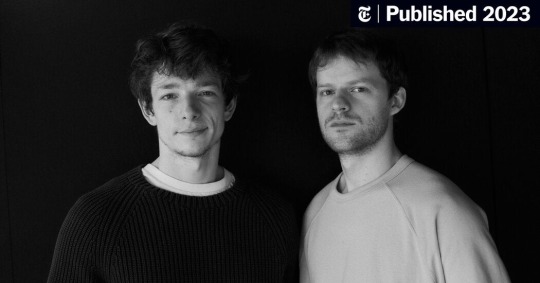
7 notes
·
View notes




